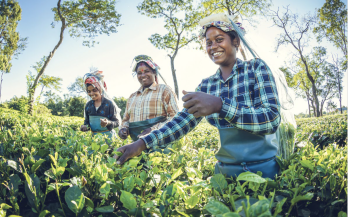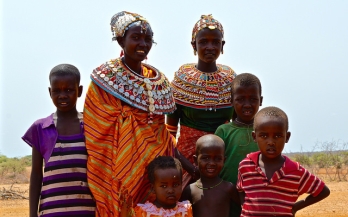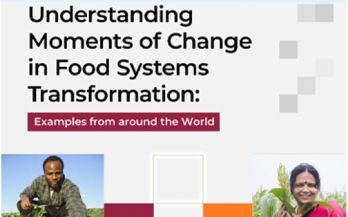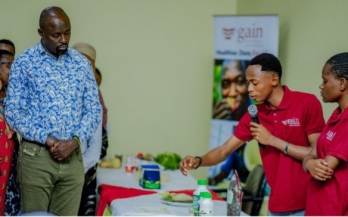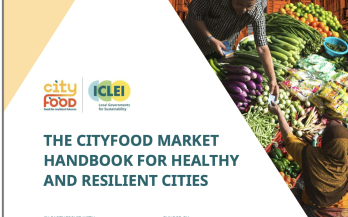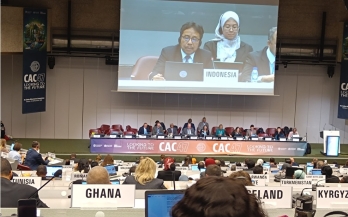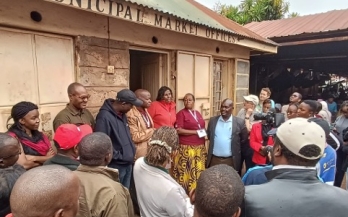- 21/11/2025
This White Paper makes the case for a territorial governance approach that reinforces urban–rural linkages by empowering local actors and enabling their collective agency. Local, traditional, and farmers markets serve as strategic hubs that offer multiple levers and diverse forms of capital for transforming food systems within cities, across urban–rural interfaces, and throughout wider territorial landscapes. Investing in both hard (physical) and soft (capacity-building) market infrastructure, supporting diverse knowledge systems, and advancing inclusive “whole-of-society” governance are essential steps toward unlocking resilient and sustainable food systems now and in the future. With these foundations in place, communities, governments, and sectors can routinely apply best practices and participate meaningfully in decision-making processes that foster a wide range of regenerative, biodiverse food value chains. Such systems create market and food environments characterized by vibrant public spaces; access to affordable, safe, culturally preferred, healthy diets; reduced and valorized food waste; and opportunities for dignified, prosperous livelihoods.
- 13/11/2025
GAIN’s contributions were made possible through the Nourishing Food Pathways programme, which is jointly funded by: German Federal Ministry for Economic Cooperation and Development; Ministry of Foreign Affairs of the Netherlands; European Union; government of Canada through Global Affairs Canada; Irish Aid through the Development Cooperation and Africa Division; and Swiss Agency for Development and Cooperation of the Federal Department of Foreign Affairs. The findings, ideas, and conclusions contained presented here are those of the authors and do not necessarily reflect positions or policies of any of GAIN’s funding partners.
The handbook is also supported by the Federal Ministry for Economic Cooperation and Development (BMZ) and Deutsche Gesellschaft für Internationale Zusammenarbeit (GIZ).
- 25/07/2025
Since the lead-up to the UNFSS, we have been supporting countries to draw up pathways to better food systems, and to begin walking the talk. But many constraints still hinder progress, and reforms are sorely needed.
That’s why we have worked with governments to develop and implement a series of practical tools to strengthen policy decision making processes and capacities. These are tools created to give users a hand over major, common barriers. They are also designed to align with or to support ongoing national processes, such as monitoring plans, or indeed continental and transnational ambitions, including the Comprehensive Africa Agriculture Development Programme (CAADP), and the seven aspirations of Agenda 2063 which call for a more prosperous, integrated, democratic, peaceful, pan- African, people-driven, and influential Africa by 2033.
The tools collected here can be instrumental: in diagnosing food systems to identify critical gaps and untapped opportunities; in shaping nimble action plans in line with national priorities; in identifying much-needed policy reforms to ensure sectors act alongside each other, rather than against; and in providing new ways to effectively navigate political, financial, and technical impediments. Barriers have stood in the path of meaningful progress for too long – we must break through them.
- 21/07/2025
Understanding Moments of Change in Food Systems Transformation
Four years on from the UN Food Systems Summit, how well are we progressing in transforming food systems so that they reduce hunger, increase access to healthy diets, reduce climate emissions, improve climate resilience, create good jobs, and nurture the environment? The numbers tell a mixed story. According to the Food Systems Countdown Initiative, itself a creation of the UNFSS, only 20 of 42 global food system indicators are trending positively (1), with none fast enough to meet 2030 SDG goals. These numbers are important but inevitably reliant on data that are 2–3 years out of date.
- 10/07/2025
The UN Food Systems Summit (UNFSS) was the first time youth were actively invited to be equal participants in a global food or nutrition summit. Youth played a pivotal role in UNFSS, contributing diverse perspectives to transform global food systems. Through youth-led dialogues, leadership in action tracks, and the UNFSS Youth Constituency, young people influenced policies, showcased innovative solutions for sustainability, and championed intergenerational equity. A key outcome of UNFSS was the Food Systems Pathways, which set out countries’ approaches for transforming their food systems to be more sustainable, inclusive, and resilient, aligned with the Sustainable Development Goals.
- 03/04/2025
Food systems, important for food security, nutrition, prosperity, and environmental well-being, are integral to all 17 Sustainable Development Goals. Traditional food markets are strategic entry points for food systems transformation, since a diversity of stakeholders (including local producers, vendors, consumers, and government), interact routinely in these spaces. These markets connect millions of stakeholders within and across local food systems and levels of government mandates. As food-insecure regions like sub-Saharan Africa (SSA) rapidly urbanise, most urban, low-income, vulnerable communities are reliant on food purchased from markets. As such, markets are key spaces to guide vendor practices, influence consumer food choices, and strengthen inclusive governance. Despite their critical value, markets’ ‘hard’ (structures and equipment) and ‘soft’ (capacities and resources) infrastructure are significantly under-supported. Investment efforts have been challenged by a lack of understanding of how markets are embedded in the wider food system and markets’ wholesale and retail dynamics, inadequate financial models, insufficient public budgets and capacity, and limited empowerment of key stakeholders.
This paper introduces and illustrates GAIN’s Inclusive Food Systems Governance Model and supporting tools. The model is designed to strengthen investment and empower voices, alongside increased efforts to ensure sustainability and resilience in traditional food markets. It has been shown to support effective market infrastructure investments, to foster local agency and inclusive and equitable food systems transformation, and to be adaptable across different contexts. The case of Marikiti Market, Machakos County (Kenya) shows the model in action, including details of specific investment components and costs. As infrastructure investments are limited, the importance of making a sound business investment case for public and private (and philanthropic) partnerships and banks to invest in traditional markets is critical.
- 31/03/2025
As cities around the world grapple with rising food insecurity, climate pressures, and deepening inequalities, food markets play a critical role in building healthier, more equitable, and climate-resilient urban food systems.
- 05/02/2025
Many low-income, food insecure, and malnutrition-vulnerable communities in Africa, Asia, and Latin America rely on traditional markets to access nutritious fresh food. However, contaminated fresh foods in markets put the well-being of consumers at risk by compromising their uptake of nutrients, needed for proper growth and health. Unsafe food also contributes to food waste and can raise food prices and lower market vendors’ profits. Improving hygiene in traditional food markets is thus vital to improving nutritional outcomes for consumers in low- and middle-income countries and can positively contribute to market vendors’ livelihoods and sustainable local food systems. In 2022, GAIN initiated a process to champion global Guidelines for Food Hygiene Controls in Traditional Markets for Food through the Codex Alimentarius Commission (CAC), where GAIN is an observer organisation Those Guidelines were adopted in November 2024.
- 29/01/2025
The public sector plays a crucial role in transforming food systems through leadership, structures, and processes like policies and budgets as well as the extent to which it enables a whole-of-society approach. Understanding public-sector governance is thus fundamental to designing and implementing food systems transformation initiatives. This working paper provides an overview of public sector governance at the country level, with a food systems lens.
Public governance models vary across countries, and understanding these is vital for addressing challenges and trade-offs and leveraging opportunities in food systems. Local governments, including city governments, have close relationships to the daily lives of residents and landscapes. This makes them key players in bringing together multiple stakeholders, implementing locally relevant solutions, and strengthening capacity through sharing best practices, tools, and lessons learned via city-to-city networks. In a similar way, global food systems-related fora can provide opportunities for national, sub-national, and local governments to enhance the evidence base on food systems transformation and shape wider food systems outlooks.
- 09/01/2025
Traditional food markets are essential in urban food environments in Kenya and other low- and middle-income countries (LMICs). They provide affordable fresh food, particularly for low-income urban communities, and are vital places of livelihoods and local economic activities. Despite their importance, associations between market-related factors and diet quality for vendors and consumers are underexplored. This study explores these relationships to inform policies aimed at improving diets and nutrition in LMICs. Methods: Survey data were collected from 1042 vendors and 876 consumers in five urban markets in Kenya.
